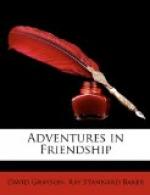Besides the drawer, the rosewood box, and the worn Bible, there is a certain Black Cape. Far be it from me to attempt a description, but I can say with some assurance that it also occupies a shrine. It may not be in the inner sanctuary, but it certainly occupies a goodly part of the outer porch of the temple. All this, of course, is figurative, for the cape hangs just inside the closet door on a hanger, with a white cloth over the shoulders to keep off the dust. For the vanities of the world enter even such a sanctuary as this. I wish, indeed, that you could see Miss Aiken wearing her cape on a Sunday in the late fall when she comes to church, her sweet old face shining under her black hat, her old-fashioned silk skirt giving out an audible, not unimpressive sound as she moves down the aisle. With what dignity she steps into her pew! With what care she sits down so that she may not crush the cookies in her ample pocket; with what meek pride—if there is such a thing as meek pride—she looks up at the Scotch Preacher as he stands sturdily in his pulpit announcing the first hymn! And many an eye turning that way to look turns with affection.
Several times Harriet and I have been with her to tea. Like many another genius, she has no conception of her own art in such matters as apple puddings. She herself prefers graham gems, in which she believes there inheres a certain mysterious efficacy. She bakes gems on Monday and has them steamed during the remainder of the week—with tea.
And as a sort of dessert she tells us about the Danas, the Aikens and the Carnahans, who are, in various relationships, her progenitors. We gravitate into the other room, and presently she shows us, in the plush album, the portraits of various cousins, aunts and uncles. And by-and-by Harriet warms up and begins to tell about the Scribners, the MacIntoshes, and the Strayers, who are our progenitors.
“The Aikens,” says Miss Aiken, “were always like that—downright and outspoken. It is an Aiken trait. No Aiken could ever help blurting out the truth if he knew he were to die for it the next minute.”
“That was like the Macintoshes,” Harriet puts in. “Old Grandfather Macintosh——”
By this time I am settled comfortably in the cushioned rocking-chair to watch the fray. Miss Aiken advances a Dana, Harriet counters with a Strayer. Miss Aiken deploys the Carnahans in open order, upon which Harriet entrenches herself with the heroic Scribners and lets fly a Macintosh who was a general in the colonial army. Surprised, but not defeated, Miss Aiken withdraws in good order, covering her retreat with two Mayflower ancestors, the existence of whom she establishes with a blue cup and an ancient silver spoon. No one knows the joy of fighting relatives until he has watched such a battle, following the complete comfort of a good supper.




